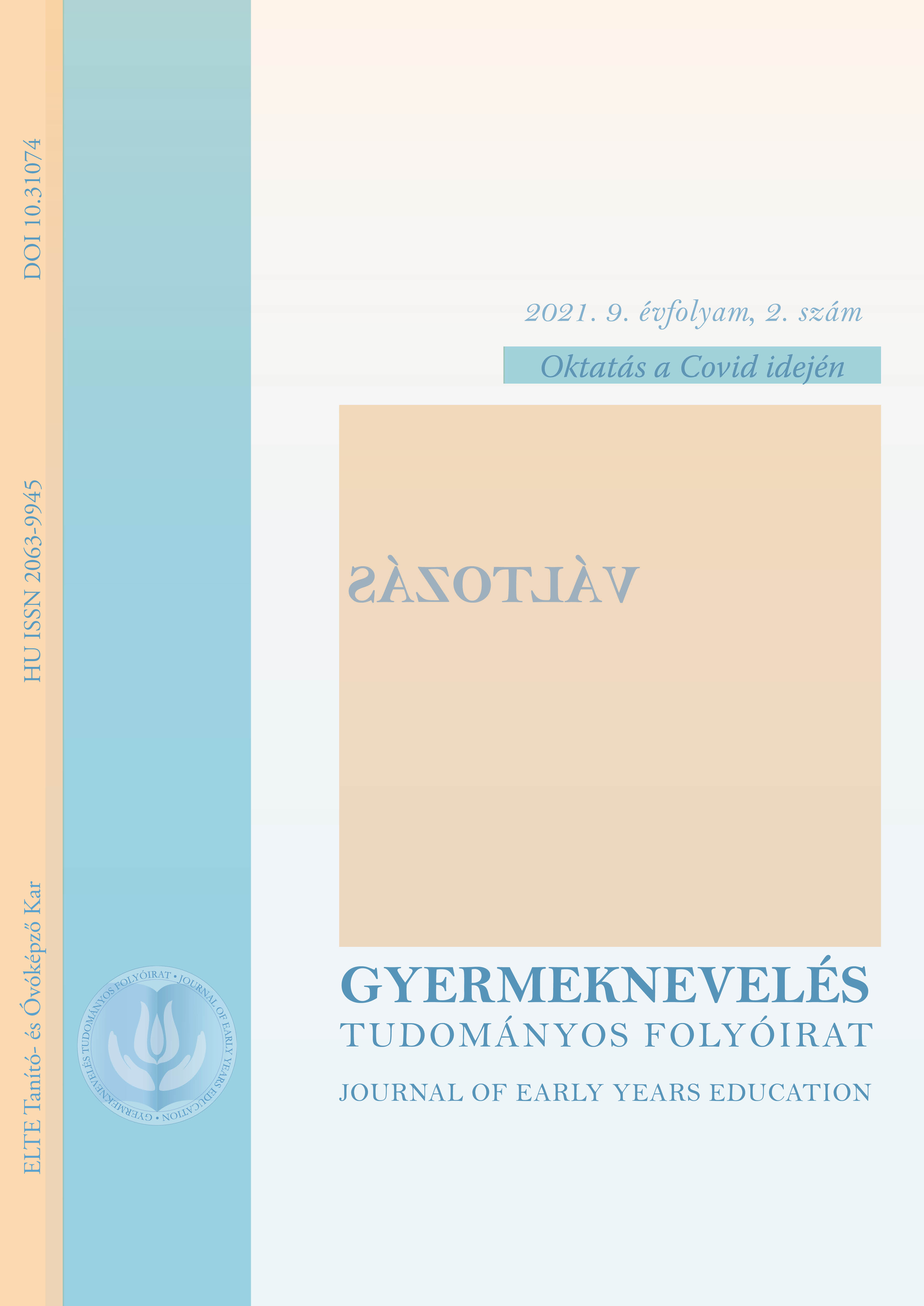Digital education from the perspective of the family
DOI:
https://doi.org/10.31074/gyntf.2021.2.205.226Keywords:
digital education outside classroms, parental roles, digital competencesAbstract
Overnight the Covid-19 pandemic completely altered our lives as well transforming the daily schedules of schools. Teachers needed to shift rapidly to dig0ital education, while at the same time, numerous forums were initiated to provide technical help for each other and gathered the tools and applications available. Parents, too, faced new challenges, since they also had to acquire new skills in order to meet the new requirements of the schools. In this non-representative research the goal was to examine how the parents of lower grade students (N=113) managed to adapt to the role of a pedagogue all of a sudden, in their home environments. The research focused on the initial period of digital education from the perspective of the parents. We examined the tools and applications utilized during the era of online education. The forms of pedagogue-student-parent communication were introduced, as well as the means of coordinating the educational process. The research also examined how the daily schedules of the students were created and what new ways of spending their free time arose. With the help of the research we can gain an insight into the months of digital education from the parents’ perspective. Generally, it was be concluded that parents and children met the requirements of the online period successfully.
Downloads
References
Benedek, A. (2013). Digitális pedagógia 2.0. Typotex Kiadó.
Bereczki, E. O. (2019). A kreativitás fejlesztése digitális eszközökkel támogatott tanulási környezetben: Mit üzennek a kutatások az osztályterem számára és mikor hallgatnak? Iskolakultúra, 29(4–5), 50–70. https://doi.org/10.14232/ISKKULT.2019.4-5.50
Bíró, Gy. (2020). A hazai digitális távoktatás tapasztalatai a COVID-19-es járványhelyzet időszakában egy kvalitatív felmérés tükrében. In Kozma, G. (Ed), Fejezetek a COVID-19-es távoktatás digitális tapasztalataiból (pp. 18–41.) Gerhardus Kiadó. https://gfe.hu/wp-content/uploads/2020/07/covid-kotet-k5.pdf (2021.08.28)
Brom, C., lukavsky, J., Greger, D., Hanemann, T., Strakova, J. & Savricek,R. (2020). Mandatory Home Education During the COVID-19 Lockdown in the Czech Republic: A Rapid Survey of 1st-9th Graders’ Parents. Frontiers in Education, 103(5), https://doi.org/10.3389/feduc.2020.00103
Buda, A. (2017). Pedagógusok az információs társadalomban. IKT és OKTATÁS. Együtt vagy egymás mellett? Belvedere Meridionale Kiadó.
Cakin, M. & Kulekci Akyavuz, E. (2021). Educational adventure of students in the COVID-19 period in Turkey: Determination of parents’ views. International Journal on Social and Education Sciences (IJonSES), 3(1), 109–125. https://doi.org/10.46328/ijonses.87
Chuanmei, D., Cao, S. & Li, H. (2020). Young children’s online learning during COVID-19 pandemic: Chinese parents’ beliefs and attitudes.Children and Youth Services Review, 118. https://doi.org/10.1016/J.CHILDYOUTH.2020.105440
Csépe, V., & Török, Á. (2020). Az okoseszközök használata kognitív idegtudományi nézőpontból. Gyermeknevelés Tudományos Folyóirat, 8(2), 133–145. https://doi.org/10.31074/gyntf.2020.2.133.145
Engler, Á. (2020). Távolléti oktatás a családok szemszögéből. Civil Szemle, Különkiadás 117–132. http://epa.oszk.hu/04100/04123/00005/pdf/EPA04123_civil_szemle_2020_ksz_117-132.pdfht (2021.04.29)
Engler, Á., Markos, V. & Dusa, Á. R. (2021). Szülői segítségnyújtás a jelenléti és távolléti oktatás idején. Educatio, 30(1), 72–87. https://doi.org/10.1556/2063.30.2021.1.6
Fekete, M. (2020). Digitális átállás – az első hét tapasztalatai. Iskolakultúra, 30(9), 77–95. https://doi.org/10.14232/ISKKULT.2020.9.77
Forgó, S. & Komló, Cs. (2015). Blended learning, tudásszervezés, hálózatalapú tudásmegosztás. Eszterházy Károly Főiskola. http://p2014-25.palyazat.ektf.hu/public/uploads/6-blended-learning-tudasszervezes-halozatalapu-tudasmegosztas-forgo-sandor-komlo-csaba-isbn_565d55661de45.pdf (2021.02. 21.)
Grover, S., Goyal, S. K., Mehra, A., Sahoo, S. & Goyal, S. (2021) . A Survey of Parents of Children Attending the Online Classes During the Ongoing COVID-19 Pandemic. The Indian Journal of Pediatrics, 88(3), https://doi.org/10.1007/s12098-020-03523-5
Hargitai, D. M., Sasné Grósz, A. & Veres, Z. (2020). Hagyományos és online tanulási preferenciák a felsőoktatásban – A Covid-járvány kihívásai. Statisztikai Szemle, 98(7) 839–857. https://www.ksh.hu/statszemle_archive/all/2020/2020_07/2020_07_839.pdf (2021.08.28)
Jakab, Gy. (2020). Digitális környezetismeret. Taní-tani Online, 08.16. http://www.tani-tani.info/digitalis_kornyezetismeret (2021.02.03.)
Lénárd, A. (2019). A digitális környezet következményei és lehetőségei kisgyermekkorban. Iskolakultúra, 29(4–5), 99–114. https://doi.org/10.14232/ISKKULT.2019.4-5.99
B. Németh, M., Hódi, Á., Juhász, F., Sárik, A., & Tóth, E. (2021). Szülők véleménye az óvodáskorú gyermekek IKT-eszköz használatának negatív és pozitív hatásairól. Gyermeknevelés Tudományos Folyóirat, 9(1), 8–38. https://doi.org/10.31074/gyntf.2021.1.8.38
Sárkány, K. (2019). Digitális oktatási tér. Új Köznevelés, 5(3–4), https://folyoiratok.oh.gov.hu/uj-kozneveles/digitalis-oktatasi-ter (2020.12.19.)
Malatyinszki, Sz. (2020). A digitális oktatás megélése. http:/doi.org/10.13140/RG.2.2.36400.38408
Papp-Danka, A. (2011). Az online tanulási környezet fogalmának értelmezési lehetőségei. Oktatás-Informatika, 3(1–2), 43. http://www.oktatas-informatika.hu/2011/12/papp-danka-adrienn-az-online-tanulasi-kornyezet-fogalmanak-ertelmezesi-lehetosegei/ (2021.01.12.)
Papp-Danka, A. (2014). Az online tanulási környezettel támogatott oktatási formák tanulásmódszertanának vizsgálata. ELTE Eötvös Kiadó.
Páli, A. (2021). Digitális oktatás során alkalmazott módszerek bemutatása. Szakdolgozat. MATE Neveléstudományi Intézet.
Racskó, R. (2017). Digitális átállás az oktatásban. Gondolat Kiadó.
Simonson, M., Zvacek, S. M. & Smaldino, S. (2019). Teaching and Learning at a Distance: Foundations of Distance Education. Information Age Publishing.
Szilveszter, Á., Kassai, R., Takács, Zs. & Futó, J. (2021). Az otthoni tanulás sikerességét bejósló tényezők a Covid-19 okozta vészhelyzet miatt kialakított digitális munkarendben eltérő szocioökonómiai helyzetű családok esetében. Educatio, 30(1), 88–102. https://doi.org/10.1556/2063.30.2021.1.7
Turzó-Sovák, N. (2020). Pedagógushallgatók digitális kompetenciáinak fejlesztési lehetőségei. Gyermeknevelés Tudományos Folyóirat, 8(2), 164-173. https://doi.org/10.31074/gyntf.2020.2.164.173
Thékes, I. (2020). A COVID-19 vírusjárvány miatti hazai távoktatás digitális megoldásainak elemzése. In Kozma, G. (2020, Eds.), Fejezetek a COVID-19-es távoktatás digitális tapasztalataiból (pp. 7–18.) Gerhardus Kiadó.
Downloads
Published
How to Cite
Issue
Section
License
Copyright (c) 2021 Author

This work is licensed under a Creative Commons Attribution-NonCommercial-ShareAlike 4.0 International License.

